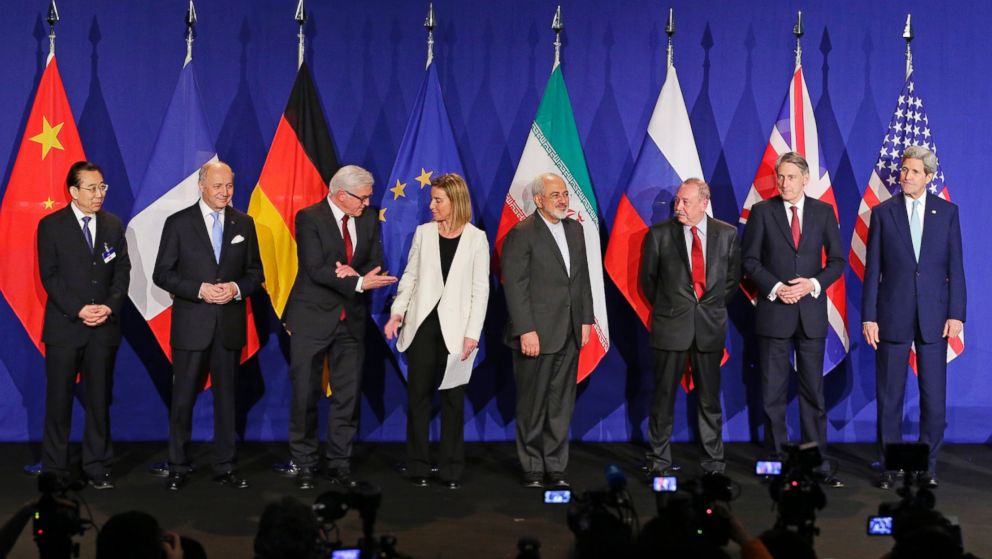The Islamic Republic of Iran is often seen, with some justification, as a radical, aggressive and disruptive force in the Middle East. Rising tensions with Israel over Iran’s presence in Syria, as well as Iran’s sharpening rivalry with Saudi Arabia, could trigger an even worse regional conflict than those already in progress.
The danger would be increased by U.S. President Donald J. Trump fulfilling his threat to rip up the nuclear deal with Iran. This step would reinforce Tehran’s deep sense of insecurity and free it to restart its atomic weapons program.
Some observers see Iran’s repeated aggression as the inevitable product of it being a revolutionary state. Radical zeal often impels such states to spread what they see as the benefits of their revolution to their neighbors. This may have been true of Iran during the fervor that followed its 1979 revolution, but it is scarcely the case now. The regime’s decision to help prop-up Syrian President Bashar al-Assad is evidence for this conclusion.
Some Iranian political factions, such as that of former President Mahmoud Ahmedinejad, argued against helping to put down the popular rebellion in Syria. In their view, doing so contradicts revolutionary Iran’s ideals of defending the downtrodden. They were overruled by more ruthlessly pragmatic figures.
These realists saw saving a rare ally, however appalling his actions, as essential to prevent Iran from becoming encircled by enemies. This consideration far outweighed any sense of values.
The intervention in Syria shows how the Iranian leadership’s main motivation now is the preservation of their Islamic Republic system of rule. This feeling is heightened by a long-standing sense of insecurity.
Some of these insecurities stem from being a non-Arab outlier and Shia Muslim majority nation in a Middle East region where Sunnis are far more numerous. To some extent, Iran sees itself as the protector of Shias beyond its borders too.
But Iran’s deeply ingrained distrust of the outside world is the most significant factor, and there are concrete reasons for it. Iranians often cite the overthrow of Prime Minister Mohammad Mossadegh in 1953 as an example of the West’s persistent interference in their internal affairs.
Mossadegh’s democratically elected government was ousted in a coup backed by the U.S. and the U.K. They disliked his decision to nationalize the Iranian oil industry that was largely controlled by their companies. Their ally Shah Raza Pavlavi then became increasingly dictatorial until he was felled by the 1979 revolution.
For the current leadership, more recent events weigh even heavier on their consciousness. The formative experience of many of them was the attack of Iraq’s Saddam Hussein on Iran in 1980 and the horrific eight-year war that followed.
Their worldview was conditioned by much of the West and almost all of their neighbors supporting the aggressor, Saddam, and turning a blind eye to his repeated use of chemical weapons against Iranian soldiers and civilians.
The outlook of the Islamic Republican establishment was hardened further by U.S. President George W. Bush‘s post-9/11 description of Iran as part of the “Axis of Evil” and invasion of next-door Iraq.
While this did at least relieve them of the threat of Saddam, the Iranian regime was more concerned that it would be the next American target for regime change.
None of this is intended to paint Iran as an innocent and plucky underdog or absolve it of its many sins. Iran bears full responsibility for its involvement in horrific terrorist acts against Israeli targets, building-up Hezbollah as a heavily armed state-within-a-state in Lebanon, complicity in attacks on U.S. troops in the Middle East and participation in Assad’s atrocities in Syria. Nor is it to ignore the dubious economic self-interest of the Islamic Republic’s Revolutionary Guard Corps in retaining power and pursuing its overseas adventures.
But, like it or not, Iran, is a significant force in the Middle East. There is more to its conduct than pure belligerence that needs to be countered. Averting further conflict and improving the situation in the region requires engagement based upon a clearer understanding of what drives its behavior.
This includes recognizing the immense internal political challenges the Iranian officials in favor of greater international cooperation faced in persuading the hardliners to accept the 2015 nuclear deal. Until very late in the process, these powerful hardliners included the Supreme Leader, Ali Khamenei. They saw Iran’s nuclear program as the ultimate defense against outside interference and argued that the West could not be trusted.
Ripping up the deal would prove the hardliners right. It would also compound the already high degree of distrust of the West and insecurity felt by the Islamic Republic’s hierarchy. This would make dealing with them peacefully almost impossible for the foreseeable future.
The nuclear deal took a decade to negotiate and involved painstaking work and compromises on all sides. Those in the U.S. who advocate withdrawing from it bemoan the agreement’s failure to address Iran’s other malign activities. But had the nuclear issue not been dealt with in isolation, then no agreement would have been possible. All withdrawal would achieve is removing a substantial constraint on Iran’s development of a nuclear weapons capability.
Rather than pushing the Iranian regime further into a corner and confirming its presumption of Western perfidy, we should build upon the modicum of trust developed during the negotiation and early years of implementation of the nuclear deal.
Further talks on regional security issues should be pursued, separately from the nuclear matter, incorporating as many of the main Middle Eastern powers as possible. This would be the best way to resolve the issues surrounding Iran’s role in the region that opponents of the nuclear agreement claim to be most concerned about.


